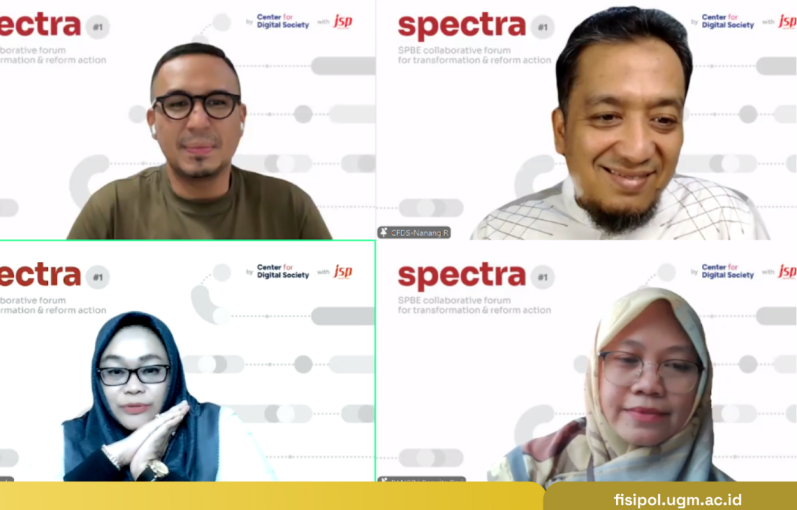
Yogyakarta, July 1st 2025─In order to strengthen digital governance and promote cross-sector data interoperability, the Center for Digital Society (CfDS) collaborated with Jogja Smart Province (JSP) to hold a public discussion titled “The Roadmap of SPBE 2025: Strengthening Digital Governance and Data Interoperability.” The discussion features three main speakers: Perwita Sari (Policy Formulation Coordinator for SPBE Implementation, Ministry of PAN-RB), Nanang Ruswianto (Chair of the SPBE Assessment Team at UGM), and Sayuri Egaravanda (JSP Team).
This discussion is a follow-up to Presidential Regulation No. 132 of 2022 concerning the Architecture of the National Electronic-Based Government System (SPBE). CfDS and JSP strive to promote more efficient, transparent, and adaptive digital governance in order to improve the quality of public services at the central and regional levels.
This activity aims to equip participants with a basic understanding and initial awareness of the process and their strategic role in realizing government data integration (Government Data Management/TDP) as the main foundation of an integrated SPBE. As part of the national priority agenda, SPBE is expected to be able to drive the digital transformation of bureaucracy towards inclusive public services that are oriented towards the needs of the community.
In his presentation, Nanang Ruswianto highlighted various challenges in implementing SPBE, particularly those related to the readiness of civil service resources (ASN). “Adapting to digital technology takes time, and often ASN are not fully prepared to face these changes. Budget, infrastructure, and technological human resource limitations are major obstacles, especially in rural areas,” he explained. He also emphasized the importance of establishing a clear information technology management team and building strategic cross-sector partnerships as key steps toward successful digital transformation.
Meanwhile, Sayuri Egaravanda revealed that there is a gap between the increasingly digital expectations of the public and the government’s capacity, which has not been able to fully adapt. “The demands of society are changing rapidly. They want all services to be online. However, the government often lags behind due to limited resources. Therefore, adjustments must be made, both in terms of finance, infrastructure, and regional development priorities,” she said.
This discussion emphasized that the success of SPBE is not only determined by policy or technology, but also by cross-sector collaboration, human resource readiness, and a commitment to continuously adapt to digital dynamics. The Roadmap of SPBE 2025 is expected to serve as a strategic guide for all stakeholders in building an integrated and sustainable digital government ecosystem.
